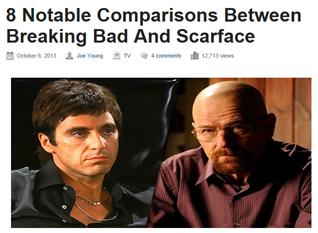AND OLIVER STONE CALLS 'BREAKING BAD' FINALE "RIDICULOUS"
 Breaking Bad creator Vince Gilligan has said that he envisioned his show as Mr. Chips becoming Scarface. Now that the AMC series has come to a close, WhatCulture's Joe Young has posted "8 Notable Comparisons Between Breaking Bad And Scarface." Moving from headings such as "Drugs" and "Family," to "Violence" and "Memorable Dialogue," the article is illustrated with images and video clips. The other headings are "Greek Tragedy," "Both Characters Are Eventually Honest With Who They Are," "Neither A Good Advert For Drug Use," and "Explosive Endings."
Breaking Bad creator Vince Gilligan has said that he envisioned his show as Mr. Chips becoming Scarface. Now that the AMC series has come to a close, WhatCulture's Joe Young has posted "8 Notable Comparisons Between Breaking Bad And Scarface." Moving from headings such as "Drugs" and "Family," to "Violence" and "Memorable Dialogue," the article is illustrated with images and video clips. The other headings are "Greek Tragedy," "Both Characters Are Eventually Honest With Who They Are," "Neither A Good Advert For Drug Use," and "Explosive Endings."Meanwhile, during a press conference this week for the DVD release of his Showtime series The Untold History of the United States, Scarface screenwriter Oliver Stone called the Breaking Bad finale "ridiculous," according to Forbes' Todd Gilchrist. With SPOILERS from the season finale, here is an excerpt from Gilchrist's article:
Speaking to press about the rejuvenating effects of working on documentaries in comparison to his feature work, he suggested that fiction filmmaking has lost respect for the kind of escapism it provides audiences, evidenced by the final episode of Breaking Bad. “There’s too much violence in our movies – and it’s all unreal to me,” he said. “I don’t know if you saw the denouement [of Breaking Bad], I happen to not watch the series very much, but I happened to tune in and I saw the most ridiculous 15 minutes of a movie – it would be laughed off the screen.”
Stone pointedly critiqued Walter White’s method of handling the gang that kidnapped Jesse. “Nobody could park his car right then and there and could have a machine gun that could go off perfectly and kill all of the bad guys! It would be a joke,” he insisted. “It’s only in the movies that you find this kind of fantasy violence. And that’s infected the American culture; you young people believe all of this shit! Batman and Superman, you’ve lost your minds, and you don ‘t even know it! At least respect violence. I’m not saying don’t show violence, but show it with authenticity.
The Untold History of the United States offers a fascinating look at American history, re-examining pivotal moments in the shaping of our culture and our democracy, by placing events like the development of the atomic bomb in a larger, more well-rounded context. When asked whether mainstream entertainment could provide similar sorts of lessons about American culture, Stone said that the infrastructure of studio blockbusters often obscures those potential insights.
“I wouldn’t criticize everything. I’m just saying it’s the level of violence,” Stone explained. “If people think that bringing a machine gun to your last meeting is a solution to a television series that’s very popular, I think they’re insane. Something’s wrong. It’s not the world we know. But I think there might be in Iron Man… there could be some good stories about war profiteering, some good moral tales. I agree. Comics were that for that reason, remember? But when you’ve reached this height of technology level of a Michael [Bay], of a Transformers, I don’t understand the meaning of it and the reason for it, except that it appeals to some visual sense, some kinetic sense of dynamism and a need for action. But action is not always a solution, character is.”
Updated: Thursday, October 10, 2013 7:50 PM CDT
Post Comment | Permalink | Share This Post



